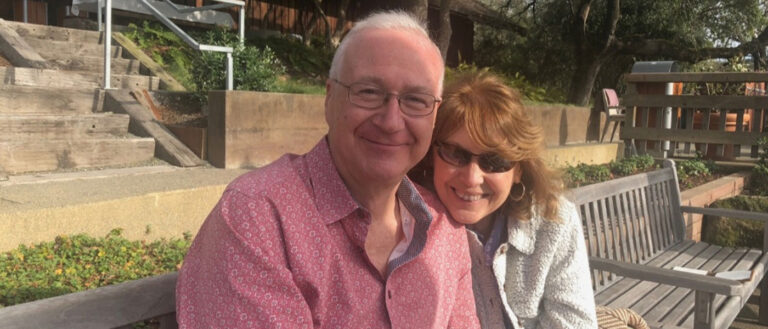Since he first stepped onto the Case Quad as an electrical engineering student in 1970, Larry Enterline (CIT ’74) has recognized the value of exploring fields beyond his specialty.
Throughout a career spanning more than four decades, Enterline has had ample opportunities to apply the cross-disciplinary skills he learned at Case Western Reserve. He’s held positions in engineering, manufacturing, marketing and sales—with each discipline enhancing and informing the next.
Today, the now-retired chief executive of Fox Factory Holding Corp, a manufacturer of high-performance racing shocks used in off-road competition, is investing in the promise of such complementary work. He and his life partner, Kathy Richards, have committed $2.5 million to the university’s 200,000-square-foot Interdisciplinary Science and Engineering Building (ISEB) project. A century bond the university issued last year will allow the gift to be fully matched, increasing the couple’s impact to $5 million.
“As an alumnus who majored in electrical engineering, Larry went on to a career that required this knowledge—as well as expertise in areas ranging from manufacturing to marketing and sales,” President Eric W. Kaler said. “He recognizes the value of interdisciplinary efforts, and we deeply appreciate the commitment that Larry and Kathy have made to support the ISEB.”
Also the vice chairs on the project’s campaign cabinet, Enterline and Richards firmly believe that the 200,000 square-foot structure will lead to still more cross-disciplinary research— benefitting faculty, students and, ultimately, society itself.
“If we can benefit Case School of Engineering and the College of Arts and Sciences, and enhance their collaborative efforts with other departments across the university, I’m all for it,” Enterline said. “These types of investments in Case Western Reserve’s research capabilities not only lead to important scientific advancements, but launch careers—and I’m proof of that.”
Enterline and Richards are longtime supporters of the university, making gifts to advance research regarding intellectual and developmental disabilities at the medical school and to provide technical, material and travel support to the Baja team. The new building offers the possibility of even greater impact.
“By capitalizing on opportunities like the ISEB, what Case Western Reserve is doing is good for the university,” he said. “But it’s really important for the region.”
Richards is no less inspired by the promise of the ISEB: “Larry and I are firm believers that students learn best when they have access to practical experience,” she said. “It’s a competitive world. And as the university seeks to attract the best students, faculty and staff—creating world-class labs and facilities—we’re excited to be a part of that effort.”
In addition to the building’s potential for generating transformative research, the couple also note the role such a facility can play in attracting talent—both faculty and students.
“Kathy and I are fully behind this vision—not just for the innovation that will happen there, but for fulfilling the university’s mission,” Enterline said. “In this pivotal moment, the Interdisciplinary Science and Engineering Building is not a ‘nice to have,’ it’s a ‘must have.’”


